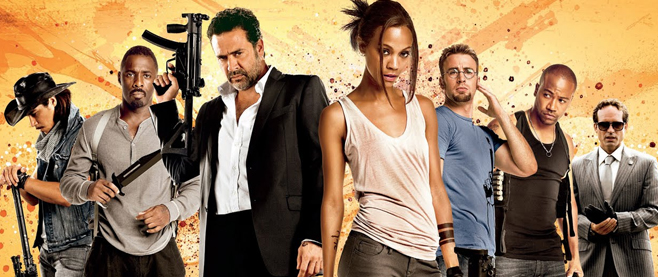Videogames vs. the World: eXistenZ
You enter the Chinese restaurant. You sit at a table with Alexa and several co-workers. A Waiter approaches.
> Order Special
The Waiter says the Special is only served on special occasions.
> Lie to Waiter
You tell the Waiter that it’s Alexa’s birthday. He tells you that is indeed a special occasion. The other people at your table leave.
> Pause game
Welcome to Unwinnable’s new column on videogames in other media. We game lovers are used to games being treated poorly on television, in books or at the movies. So when one of those gets our medium right, that’s special, worthy of praise and also worthy of examination. What do these other pieces of media get right about games, how does that make them more interesting and what do these other pieces of media say about videogames?
David Cronenberg’s 1999 film eXistenZ is my favorite videogame movie. It was released less than a month after The Matrix, which overwhelmed and rendered it largely forgotten. Not that it ever had a chance to have the other film’s massive success; eXistenZ is a deeply weird, occasionally disturbing, half-stupid, half-genius film that seems to promise action while never delivering. It’s also filled with Cronenberg’s signature body horror, with several instances of surgery, penetration and infection. Those aspects keep it interesting enough, but what I find most compelling about it is that it is a film about videogames that’s built on game mechanics, instead of the more typical videogame references. The former examines how games are played via film; the latter uses tropes which are associated with videogames (Scott Pilgrim may be the pinnacle of the latter, and I’ll be talking about it in this space soon enough).
> Resume game
The Waiter brings you and Alexa the Special. It is a cooked version of the mutated amphibian you saw before. It smells disgusting, but you are hungry.
> Eat Special
You grab a limb of the Special and eat it. You are left with an Odd Long Bone. You are still hungry.
> Eat Special
You eat more of the Special. You now have an Odd Squat Bone.
> Combine Bones
They fit together!
The key to understanding eXistenZ is that the film is built on game logic, using game tropes. There’s an artificial awkwardness to the proceedings from the very beginning, but that is familiar if you’ve played high-dialogue games, particularly adventures and role-playing games. There are pauses between when characters speak. Sometimes their dialogue is smooth, sometimes it’s cliché statements that exist only to move the plot along. The conflict gets kicked off in the first scene, when rock star videogame designer Allegra Geller is shot and wounded while showing her new game, eXistenZ, to a focus group. In the chaos, a low-level marketing flunky named Ted Pikul is asked to take her to safety by the PR official in charge of the event. Wounded, possibly dying, he grabs Pikul and tells him: “We have enemies in our own house. Trust no one. Trust no one!” in head-slappingly on-the-nose fashion.
> Eat Special
You eat more chunks of the Special. You get more Oddly-Shaped Bones
> Combine Bones
They fit together! They are shaped like an Odd Gun.
Yet the fun of eXistenZ is that it doesn’t bother to explain that it’s using this logic for the bulk of the film. Many of the crucial scenes take place once Pikul and Geller are able to play the eXistenZ game together. The film takes place in an unspecified future, where game input involves direct neurological stimulation, making the games a form of virtual reality. It looks just like “reality,” so the actors are the same. But the logic and actions are different. An apparent non-player character with a bizarre accent exists only to give them directions. Allegra Geller, being the game expert, walks Pikul through the sequence. She analyzes the NPC, calling out his accent and how poorly-written and developed he is. But more specifically, she explains that when he doesn’t react to what Pikul says, simply going into a behavior loop and repeating what he said, it’s the game waiting for Pikul to say the right thing.
And we’ve all played that in games. It’s especially prevalent in Japanese RPGs – Suikoden in particular was famous for having dozens of dialogue options where the NPCs/game logic simply wouldn’t accept the “wrong” answer despite giving you the choice. But it was hardly the only game like that. Allegra explaining the game logic to Ted is amusing on its face, instrumental for understanding the film and especially pointed for a game character. Ted shouting at the NPC then wondering why he’s shouting is a scene straight out of when Mass Effect has Shepard say things the player didn’t intend. Then, when Pikul and Geller start to make out awkwardly, she describes it, gasping between kisses, as a “pathetically mechanical attempt to heighten the emotion for the next game sequence,” which is essentially the purpose of romance in most games, especially (again) Mass Effect, Dragon Age and games built on the BioWare model. The game of eXistenZ is apparently built on choice, but only within a constrained set of parameters which push players down that path.
Your mouth hurts.
> Examine mouth
You poke in your mouth and discover a loose bridge of Teeth. You pull them and they come out.
> Combine Teeth with Odd Gun
The Teeth fit! You now have a Tooth-Shooting Gun.
eXistenZ isn’t just descriptive of games, it’s also aspirational. Early in the film, a fan describes one of Allegra Geller’s games in glowing terms: “Have you ever played her game heArtGod?…” Thou, the player of the game, art god.’ Very spiritual. Funny, too. God, the artist. The mechanic. Funny!” A game that instills that kind of emotional reaction is essentially Peter Molyneaux’s wet dream.
> Use Tooth-Shooting Gun on Alexa
You point the gun at Alexa. She doesn’t think that’s funny.
The film also shows the limits – or benefits – or approaching realism in game design. A panicking Ted Pikul, in eXistenZ, questions Geller about the whole point:
“I don’t like it here. We’re both stumbling around together in this unformed world whose rules and objectives are largely unknown, seemingly indecipherable or even possibly nonexistent! Always on the verge of being killed by forces that we don’t understand.”
“That sounds like my game, all right.”
“That sounds like a game that’s not gonna be easy to market.”
“But it’s a game everybody’s already playing.”
To hammer home the point, Geller raises her arms, adopting the pose of Christ on the crucifix (it’s for an impending metal detection test, but that isn’t immediately apparent). The designer is God, God is the designer, and we’re all just playing games of various complexity, whether we know it or not.
The Waiter approaches.
> Use Tooth-Shooting Gun on Waiter
You shoot the Waiter with two teeth. He dies.





